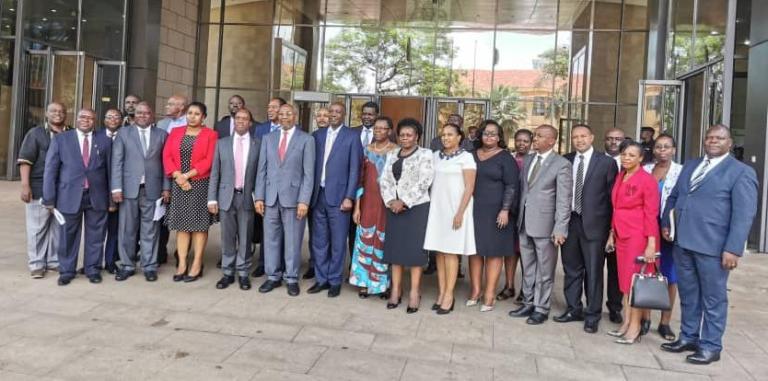PSFU Board Members in a group photo with Prime Minister, Ruhakana Rugunda and ex members at last year’s Annual General Meeting
Private sector players under their umbrella body, Private Sector Foundation Uganda (PSFU) have revealed plans and measures on how Uganda’s economy can recover from the toxic effects of COVID-19.
In a statement, Dr. Elly Karuhanga, PSFU’s Board Chairman reveals that they have recently held several meetings with Government and development partners in an attempt to devise mitigation measures to contain the effects of COVID 19.
“These measures have been directly focused on curtailing infections, supporting testing, isolation and treatment. Uganda has not recorded a single death resulting from this pandemic. The private sector appreciates government efforts in this regard,” Karuhanga says.
He adds: “As PSFU and on behalf of the private sector we are pledge bound to support all initiatives being outlines by both Government and the donor community in a bid to protect Uganda’s from the effects of this pandemic. PSFU focus has been and continues to be on ensuring that both people and businesses survive after this pandemic and we believe all efforts are geared towards this goal.”
PSFU reveals that the effects of Coronavirus (COVID-19) will require that Uganda’s objectives and priorities are reviewed and reconsidered with special attention to those areas that directly affect the health of persons and businesses.
PSFU membership also applauds the Government of Uganda for its efforts in saving the lives of Ugandans by containing the spread of coronavirus.
“The Ministry of Health has done an incredible job to sensitize and offer guidelines to the public to prevent the spread of coronavirus. In particular we recognize HE President of the Republic of Uganda’s strong stance to guide Ugandans in averting the deadly virus,” Karuhanga says.
In order to further support Government efforts, he says, PSFU has proposed intervention areas to ensure businesses continue to support the economy while producing health care equipment and medicines to protect, test, and treat COVID 19 victims.
“These have largely been agreed to by Cabinet and we are working with government towards a partial opening of businesses. However, businesses will be urged to continue ensuring that we strictly observe the SOPs as given by the Ministry of Health,” he says.
The general areas of consensus with government have included the following;
• Payment of Domestic arrears and outstanding VAT refunds.
• Restriction of Open Market Operations to; financing maturing debt, stabilization of the shilling and domestic arrears to increase liquidity in the market.
• Restructure and Capitalize the Uganda Development Bank (UDB) to enable the bank mobilize more money by issuing its own instruments
• Improve the administration of the Agriculture Credit Facility
• De-risk Micro Small and Medium Enterprises & Households borrowers through the promotion of production under Lead Firm Structures using the Value Chain approach and linking financing to both horizontal and vertical chains.
• Deferment of Statutory payments for 6 months. Deferment of Payroll Taxes and NSSF remittances to ease business cashflows for next 6 months.
• Proposal of turnover tax in the current budget proposal should be postponed to next FY (21/22).
• Effectively implement the Buy Uganda Build Uganda (BUBU) policy and support local production
• Tax on rental properties be frozen for six months effective April 2020 and no taxes should be increased on rental properties
• Support the tourism sector with a line of financing through Uganda Development Bank
• Support restructuring of loan repayment for hotels to give a grace period of 6 months.
• Promote Producer groups & cooperatives and an efficient Warehouse Receipt System to ensure food security.
• Support incubation to ensure value addition for both domestic and export markets
• Recapitalize Uganda Air Cargo (USD 12Million) to ensure foreign market expansion. Ensure participation of the private Sector on the Board of Uganda Air Cargo (50% of the positions)
• Lower taxes on products produced with locally sourced raw materials. For example, excise duty on fruit juices
“Following the consensus that has been forged with government and the short term interventions drawn to support recovery, we are now organising an e-conferenceintended to reach as many Ugandans to discuss and agree on measures that can be taken in the medium to long term to get Uganda better prepared for similar crises in the future,” PSFU says.
“Meanwhile, PSFU urges government of Uganda to effectively manage our borders so that the good efforts so far made in averting the potential effects of this pandemic are note eroded by irate truck driverscrossing into Uganda from the neighbouring countries,” it adds.
Karuhanga reveals that as representatives of the business community, they are happy to work with all development partners and government in ensuring that these recommendations come to pass.
This, he says, will give a lot more confidence in Uganda’s economy for further investments and we look forward to working with all on developing a “post COVID 19 recovery and growth strategy”.
Karuhanga is deputised by former Agriculture Minister, Victoria Sekitoleko.
Other members who were elected to the PSFU Board last year include; Sarah Kagingo, Issa Ssekito Humphrey Nzeyi, Rajesh Chaplot, Civy Tumusiime, Angella Bageine, Julian Omalla, Gordon Sentiba, Charles Kareeba, Eng. Keneth Kaijuka. Gideon Badagawa, the current Executive Director is an Ex Officio.






